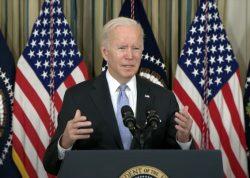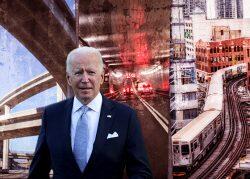 House passes $1 trillion infrastructure bill
House passes $1 trillion infrastructure bill
Trending
With influx of funds, infrastructure work becomes priority in Chicago
Chicago to get $63B in state and federal funding for aging infrastructure

Chicago infrastructure is due for a major overhaul, and with billions in state and federal funding, the city is at a critical point in repairing aging bridges, roads and transportation systems, according to a report by Crain’s Chicago Business. The paper details the biggest infrastructure needs and how the city is addressing them with a recent windfall of cash earmarked for infrastructure projects.
Priorities include repairing roads and highways and updating CTA train stops. Some in the city also see it as an opportunity to address inequalities, with plans to add bus lines and stops in poorer, minority neighborhoods that have historically been cut off from the city’s public transportation system.
The city is set to receive $18 billion in federal infrastructure funds, in addition to $45 billion in state money. That $63 billion will help repair infrastructure that hasn’t seen adequate upgrades or maintenance in decades.
“It’s massive,” Gia Biagi, commissioner of the Chicago Department of Transportation, told Crain’s. “Everybody recognizes this is a moment. It is a singular chance to shift fortunes and to scale everything up.”
According to Crain’s, the Chicago area is home to some of the country’s oldest infrastructure. Interstate 94 opened in 1951, the Loop elevated line opened in 1897 and the city’s waterway system is the oldest of all three. Infrastructure maintenance wasn’t a concept until much later, and post World War II the recommendation was to use roads until their lifespan was over, and then build new ones.
“For too long they’d let an asset run down past its useful life and cancel it out,” P.S. Sriraj, director of the Urban Transportation Center at the University of Illinois Chicago, told Crain’s. What early transportation experts didn’t understand is what researchers in his field discovered about 20 years ago: That maintenance every two to five years of a rail line, road, bridge or a highway “would actually pay off over the long run” and not lead to the crisis moment we are experiencing today. “The nation’s infrastructure is crumbling,” Sriraj says. “These assets have not been maintained or renovated as needed on a frequent basis.”
The funds also will be used to address infrastructure improvements that can help mitigate the effects of climate change. Those projects include replacing 400,000 water lines that contain lead, and repairing Lake Michigan’s shoreline. It will also extend broadband access and convert the city’s bus system to electric buses.
Experts in the report agreed that while the funding will improve many woes for the city, additional federal funding will be needed to combat the neglected infrastructure.
“You’re not going to make up for decades of disinvestment in one bill,” but it “will absolutely make a dent,” Dorval R. Carter Jr., president of the Chicago Transit Authority said to Crain’s.
[Crain’s Chicago] — Miranda Davis
Read more
 House passes $1 trillion infrastructure bill
House passes $1 trillion infrastructure bill
 What’s in the $1T infrastructure bill for real estate
What’s in the $1T infrastructure bill for real estate




